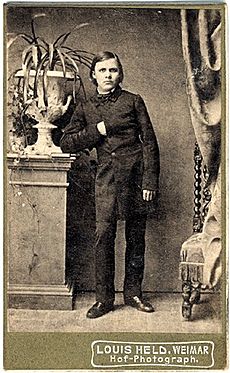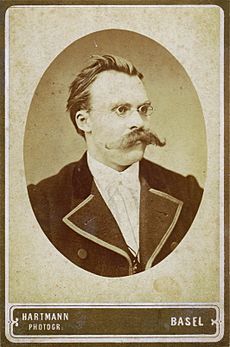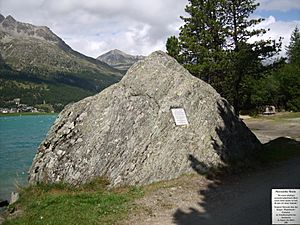Friedrich Nietzsche facts for kids
Quick facts for kids
Friedrich Nietzsche
|
|
|---|---|
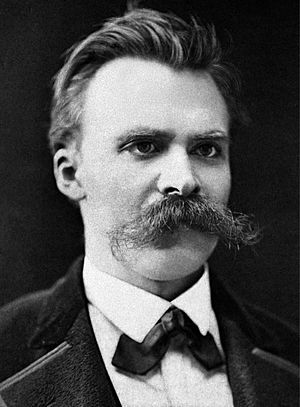
Nietzsche in Basel, Switzerland, c. 1875
|
|
| Born |
Friedrich Wilhelm Nietzsche
15 October 1844 Röcken, Saxony, Prussia, German Confederation
|
| Died | 25 August 1900 (aged 55) Weimar, Saxe-Weimar-Eisenach, German Empire
|
| Alma mater |
|
| Era | 19th-century philosophy |
| Region | Western philosophy |
| School |
Other schools
Anti-foundationalism
Anti-nihilism / nihilism (disputed) Atheism Dionysianism Dionysian pessimism Existentialism German Romanticism (disputed) Immoralism Metaphysical voluntarism Naturalism Perspectivism Philosophical realism Political realism |
| Institutions | University of Basel |
|
Main interests
|
|
|
Notable ideas
|
Amor fati
Apollonian and Dionysian Eternal return Fact–value distinction Genealogy God is dead Herd instinct Last man Master–slave morality Nietzschean affirmation Nihilism Perspectivism Ressentiment Transvaluation of values Tschandala Übermensch Will to power |
|
Influenced
|
|
| Signature | |
Friedrich Wilhelm Nietzsche (born October 15, 1844 – died August 25, 1900) was an important German thinker. He was a philosopher, a poet, and a cultural critic. His ideas have had a huge impact on modern philosophy.
Nietzsche started his career studying ancient languages and history, especially Greek and Latin. He became a professor at the University of Basel in Switzerland when he was only 24 years old. This made him the youngest person ever to hold that position. He had to leave his job in 1879 because of serious health problems. He wrote most of his famous books in the ten years after that.
In 1889, at age 44, Nietzsche became very ill and lost his mental abilities. He spent his last years being cared for by his family. He died in 1900.
Nietzsche's writings include philosophical arguments, poems, and cultural criticisms. He often used short, clever sayings called aphorisms. Some of his main ideas include:
- Questioning the idea of absolute truth.
- Looking at how our ideas of right and wrong developed over time.
- The idea of "God is dead", meaning that traditional beliefs no longer guide people.
- The concepts of Apollonian and Dionysian forces in art and life.
- The idea of the "will to power" and the "Übermensch" (Superman).
After he died, Nietzsche's sister, Elisabeth Förster-Nietzsche, took charge of his writings. She changed some of his unpublished works to fit her own political beliefs, which were linked to German nationalism and antisemitism. This made it seem like Nietzsche supported these ideas, even though he was against them. Later scholars helped correct these misunderstandings. Nietzsche's ideas became very popular again in the 1960s and continue to influence many thinkers today.
Contents
Nietzsche's Life Story
Early Years (1844–1868)
Friedrich Nietzsche was born on October 15, 1844, in a town called Röcken, near Leipzig, in Prussia (now Germany). He was named after King Friedrich Wilhelm IV of Prussia. His father, Carl Ludwig Nietzsche, was a pastor and teacher. His mother was Franziska Nietzsche.
Friedrich had two younger siblings: a sister, Elisabeth, and a brother, Ludwig Joseph. Sadly, his father died when Friedrich was only five, and his younger brother died six months later. After these losses, the family moved to Naumburg.
Nietzsche went to a boys' school and later to a private school. He was very good at Christian theology. In 1858, he received a scholarship to Schulpforta, a famous school. There, he learned Greek, Latin, Hebrew, and French. He also spent time writing poems and composing music.
Nietzsche was an amateur composer. However, famous musicians like Richard Wagner and Hans von Bülow did not think highly of his music.
While at school, Nietzsche read works by poets like Friedrich Hölderlin. He also became interested in the writings of Arthur Schopenhauer in 1865. Schopenhauer's ideas about philosophy greatly influenced Nietzsche. He also read Friedrich Albert Lange's History of Materialism, which made him think about science and evolution.
In 1867, Nietzsche joined the Prussian army for a year. He was a good rider, but he had an accident in 1868 that injured his chest. This made it hard for him to walk for months. After this, he focused on his studies again. Later that year, he met the famous composer Richard Wagner for the first time.
A Professor in Basel (1869–1879)
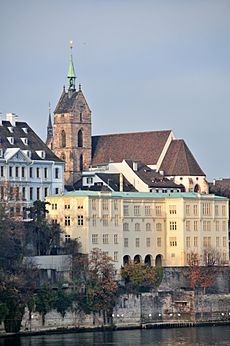
In 1869, when Nietzsche was only 24, he was offered a job as a professor at the University of Basel in Switzerland. He accepted the offer, even though he hadn't finished his doctorate yet. He is still one of the youngest professors of classical studies on record.
Before moving to Basel, Nietzsche gave up his Prussian citizenship. For the rest of his life, he did not belong to any country.
During the Franco-Prussian War (1870–1871), Nietzsche served as a medical helper. He saw the terrible effects of war and also got sick with diphtheria and dysentery. When he returned to Basel, he felt like an outsider watching the new German Empire being formed.
Nietzsche greatly admired Richard Wagner and his wife, Cosima. He often visited them. In 1872, Nietzsche published his first book, The Birth of Tragedy. In this book, he explored ideas about ancient Greek art and drama. However, his colleagues didn't like it much because it was very different from traditional academic work.
Between 1873 and 1876, he published four essays that were later collected as Untimely Meditations. These essays criticized German culture. During this time, he became friends with Paul Rée. However, Nietzsche was disappointed by the Bayreuth Festival in 1876, which celebrated Wagner's music. He felt it was too ordinary and that Wagner was too focused on fame. This led him to distance himself from Wagner.
In 1878, Nietzsche published Human, All Too Human, a book of short sayings about many topics. His health continued to get worse, with problems like poor eyesight, headaches, and indigestion. In 1879, he had to resign from his job at Basel and retired with a pension.
An Independent Thinker (1879–1888)
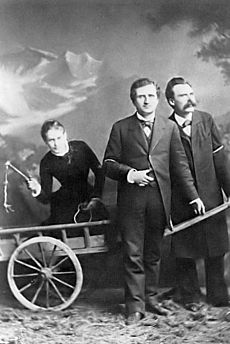
After leaving his professorship, Nietzsche traveled a lot to find places that were better for his health. He spent summers in Switzerland and winters in Italy and France. He sometimes visited his family in Naumburg, but he often had disagreements with his sister, Elisabeth.
Because his eyesight was failing, Nietzsche tried using typewriters. His former student, Peter Gast, became his private secretary, helping him write and proofread his books. Gast remained a loyal friend throughout Nietzsche's life.
This period was Nietzsche's most productive. From 1878 to 1888, he published a major book almost every year. In 1882, he published the first part of The Gay Science. That same year, he met Lou Andreas-Salomé, a bright young woman. Nietzsche and his friend Paul Rée both developed feelings for Salomé. They traveled together, planning to create a shared academic living arrangement. However, the friendship broke apart due to romantic complications and his sister Elisabeth's interference. This caused Nietzsche a lot of sadness and anger towards his sister.
Despite his illness and loneliness, Nietzsche continued to write. He wrote the first part of Thus Spoke Zarathustra in just ten days. This book had a new, unique style, but it was not very popular at first.
In 1886, Nietzsche stopped working with his publisher because he disliked the publisher's antisemitic views. Nietzsche was strongly against antisemitism. He then paid to publish Beyond Good and Evil himself. He also re-released his earlier works with new introductions. He hoped more people would start reading his books, and slowly, interest in his ideas did grow.
In 1886, his sister Elisabeth married an antisemite and moved to Paraguay to start a "Germanic" colony. Nietzsche's relationship with her remained complicated.
In 1887, Nietzsche wrote On the Genealogy of Morality. He also discovered the works of Fyodor Dostoevsky, a Russian writer, and felt a strong connection to his ideas.
In 1888, Nietzsche's health improved, and he was in good spirits. He wrote Twilight of the Idols and The Antichrist. He also started writing his autobiography, Ecce Homo, where he wanted to explain his own ideas clearly.
Illness and Passing (1889–1900)
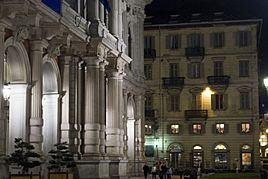
On January 3, 1889, Nietzsche suffered a mental breakdown in Turin, Italy. A famous story says he saw a horse being whipped, ran to protect it, and then collapsed. After this, he sent strange notes to his friends, signing them "Dionysus" or "the crucified one."
His friends brought him to a psychiatric clinic. He was very ill. His mother then moved him to her home in Naumburg. During this time, his friends decided not to publish some of his more radical works, like The Antichrist.
In 1893, his sister Elisabeth returned from Paraguay. She began to manage Nietzsche's writings and publications. After their mother died in 1897, Nietzsche lived with Elisabeth in Weimar. She cared for him and allowed visitors to see him, even though he could no longer communicate.
Nietzsche suffered several strokes in 1898 and 1899, which left him partly paralyzed and unable to speak or walk. He died on August 25, 1900, after another stroke and pneumonia. He was buried next to his father in Röcken.
His sister Elisabeth later put together a book called The Will to Power from his notes. However, scholars now agree that this book does not truly represent Nietzsche's original intentions because his sister changed and arranged the material to fit her own ideas.
Nietzsche's Background
Nietzsche is usually called a "German philosopher." He was born in Prussia, which is now part of Germany. However, when he became a professor in Switzerland, he gave up his Prussian citizenship. So, for the rest of his life, he officially had no country.
Towards the end of his life, Nietzsche believed his family came from Polish nobility. He even wore a ring with a Polish family symbol. He wrote that he was "pure-blooded Polish nobleman." However, most scholars disagree with this. They say his family had German names and were German Lutheran clergymen for many generations. The name "Nietzsche" is also a common German name. It's not clear why Nietzsche claimed Polish ancestry, but some think it might have been a joke or a way to show his dislike for German nationalism.
Nietzsche's Big Ideas
Nietzsche's ideas are often debated because of his unique writing style and challenging thoughts. His philosophy is seen as very revolutionary.
Apollonian and Dionysian Forces
Nietzsche used the ideas of Apollo and Dionysus, two gods from ancient Greek mythology, to explain art and life.
- Apollo represents order, harmony, logic, and clear thinking. It's like a calm, beautiful dream.
- Dionysus represents disorder, emotion, passion, and unity. It's like a wild, joyful celebration.
Nietzsche believed that the best ancient Greek tragedies combined these two forces. The heroes in these plays faced terrible suffering (Dionysian chaos) but tried to bring order to it (Apollonian control). This allowed the audience to feel the deep emotions of life and affirm it, even with its difficulties.
He thought that after the ancient Greek tragedians, this perfect balance was lost. He criticized later thinkers like Socrates and Plato for focusing too much on reason and logic, which he felt took away from the power of myth and suffering in art. For Nietzsche, both Apollonian and Dionysian forces are needed to create great art and a full life.
The Idea of Perspectivism
Nietzsche famously said that "God is dead". This meant that traditional beliefs and values, especially those from Christianity, no longer provided a clear meaning or purpose for life in modern society. He believed this would lead to the realization that there is no single, universal truth or perspective on things.
This idea is called perspectivism. Nietzsche argued that all knowledge is based on different viewpoints or interests. There is no "objective reality" that everyone sees the same way. Instead, our understanding of the world depends on our own unique perspective. This means we constantly need to rethink our rules and values based on different situations and viewpoints.
In Thus Spoke Zarathustra, Nietzsche said that every great person creates their own set of values. He believed that what makes people great is not the specific values they choose, but the act of creating and striving for those values. The willingness to create is more important than the goal itself.
Master and Slave Morality
In his books Beyond Good and Evil and On the Genealogy of Morality, Nietzsche explored how our ideas of right and wrong developed. He suggested there were two main types of morality:
- Master Morality: This was the original type of morality, found in ancient warrior societies. "Good" meant being strong, wealthy, healthy, and powerful. "Bad" meant being weak, poor, or pathetic. This morality came from the powerful, who saw themselves as good and looked down on the weak.
- Slave Morality: This developed as a reaction to master morality. It came from the weak or "slaves" who felt resentment towards the powerful. In this morality, "good" became associated with humility, kindness, and self-sacrifice. "Evil" became associated with being worldly, selfish, and aggressive. Nietzsche linked this to Jewish and Christian traditions. He believed it allowed the weak to feel better about themselves by turning their weaknesses (like being humble) into virtues.
Nietzsche thought that slave morality led to a kind of nihilism in Europe, where life seemed to lose its meaning. He encouraged special individuals to create their own values, rather than following a "morality-for-all" that he felt was harmful to strong, unique people. His famous motto was from the poet Pindar: "Become what you are."
It's important to know that Nietzsche was not antisemitic. He strongly criticized antisemitism and saw it as "despicable." His criticism of "slave morality" was aimed at certain historical developments of ideas, not at Jewish people today.
The Death of God and Nihilism
Nietzsche's statement "God is dead" is one of his most famous. It doesn't mean he literally thought God had died. Instead, it meant that the traditional idea of God, which had given meaning and values to Western society for over a thousand years, was no longer believed by many. Scientific progress and a more secular world had effectively "killed" this traditional basis for meaning.
Nietzsche worried that this "death of God" could lead to nihilism. Nihilism is the belief that nothing has any real importance and that life has no purpose. While Nietzsche rejected traditional Christian morality, he also rejected this kind of nihilism.
He believed that Christian moral teachings were originally created to fight against meaninglessness. They gave people beliefs about good and evil, and a reason to believe in God. But once these beliefs faded, people might feel lost.
Nietzsche saw nihilism as a huge challenge for humanity. He believed that only by facing and overcoming nihilism could a culture truly thrive. He wanted to speed up its arrival so that it could also be overcome more quickly.
The Will to Power
A core idea in Nietzsche's philosophy is the "will to power". He believed this was a basic drive that explains human behavior better than ideas like survival or adaptation. For Nietzsche, living creatures don't just try to survive; they want to grow, overcome challenges, and exert their strength.
He disagreed with the idea that happiness is the main goal of life. Instead, he thought happiness was a result of overcoming obstacles and fulfilling this "will to power."
Nietzsche also wondered if this "will to power" might apply to the physical world, not just humans. He thought that even matter might be driven by forces interacting with each other, rather than just following fixed laws.
Eternal Return
The idea of "eternal return" is a challenging concept from Nietzsche. It suggests that the universe, and everything in it, has happened before and will happen again, exactly the same way, an infinite number of times. This is a physical idea, not about spiritual reincarnation.
Nietzsche first introduced this idea in The Gay Science and Thus Spoke Zarathustra. He saw it as a potentially "horrifying" thought, the "heaviest weight" imaginable. However, he also believed that truly embracing this idea – loving your fate (amor fati) so much that you would want every moment to repeat forever – would be the ultimate way to affirm life. It means accepting everything, good and bad, in your life.
The Übermensch
Another important concept is the Übermensch, often translated as "Superman" or "Overman." Nietzsche introduced this idea in Thus Spoke Zarathustra as a solution to the problem of the "death of God" and nihilism.
The Übermensch is someone who creates new values. This person rises above the common morality of the "herd" – the average people who follow traditional rules. The Übermensch doesn't just accept what is considered "good and evil" by others. Instead, they overcome old ways of thinking and create their own path, leading to a kind of spiritual evolution.
Nietzsche contrasted the Übermensch with the "last man" – a person who is apathetic, has no strong passions, and simply lives a comfortable, unchallenging life. The "last man" would make it impossible for the Übermensch to emerge.
It's crucial to understand that the Nazis later twisted Nietzsche's idea of the Übermensch to fit their own racist ideology, claiming it meant a literal "superior race." However, Nietzsche himself was strongly against antisemitism and nationalism. He broke with friends and publishers who held such views. He even wrote, "And finally, how do you think I feel when the name Zarathustra is mouthed by anti-Semites?" His sister, Elisabeth, was largely responsible for connecting his work to Nazism after his death by editing his writings to fit her own beliefs.
Critique of Mass Culture
Nietzsche had a critical view of modern society. He believed that newspapers and mass culture led people to be too similar and to accept mediocrity. He thought this prevented intellectual growth and could lead to a decline in humanity. He felt that some individuals, through strong willpower, could rise above mass culture and become superior, healthier human beings.
Nietzsche's Influences and Legacy
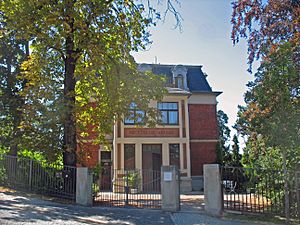
Nietzsche was a highly educated scholar of ancient Greek philosophy. He read many philosophers like Immanuel Kant, Plato, John Stuart Mill, and Arthur Schopenhauer. While he learned from them, he also often disagreed with their ideas. For example, he called Kant a "moral fanatic" and Plato "boring."
One of his most important influences was the ancient Greek philosopher Heraclitus. Heraclitus believed that everything in the universe is constantly changing, which Nietzsche liked. Nietzsche also admired the essays of Ralph Waldo Emerson, an American writer, saying he "loved Emerson from first to last."
Nietzsche also found inspiration in writers like Fyodor Dostoevsky, calling him "the only psychologist from whom I have anything to learn."
Nietzsche's Main Books
Here are some of Friedrich Nietzsche's most important works:
- The Birth of Tragedy (1872)
- Untimely Meditations (1876)
- Human, All Too Human (1878)
- The Dawn (1881)
- The Gay Science (1882)
- Thus Spoke Zarathustra (1883)
- Beyond Good and Evil (1886)
- On the Genealogy of Morality (1887)
- The Case of Wagner (1888)
- Twilight of the Idols (1888)
- The Antichrist (1888)
- Ecce Homo (1888; published in 1908)
- Nietzsche contra Wagner (1888)
Images for kids
-
Arthur Schopenhauer strongly influenced Nietzsche's philosophical thought.
-
The University of Basel, where Friedrich Nietzsche became a professor in 1869
-
Left to right: Erwin Rohde, Karl von Gersdorff and Nietzsche, October 1871
-
Lou Salomé, Paul Rée and Nietzsche travelled through Italy in 1882.
-
Turin house where Nietzsche stayed (background) seen from Piazza Carlo Alberto, where he is said to have had his breakdown (at left: rear façade of Palazzo Carignano)
-
After the breakdown, Peter Gast "corrected" Nietzsche's writings without his approval.
-
The residence of Nietzsche's last three years along with archive in Weimar, Germany, which holds many of Nietzsche's papers
See also
 In Spanish: Friedrich Nietzsche para niños
In Spanish: Friedrich Nietzsche para niños
- The Ascent of Man
- Difference (poststructuralism)
- Dionysos
- Existential nihilism
- Faith in the Earth
- Friedrich Nietzsche and free will
- Manusmriti
- Relationship between Friedrich Nietzsche and Max Stirner
- Rigveda
- When Nietzsche Wept – a film about his life
- World riddle


